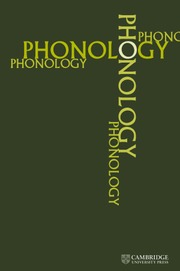Feature spreading as dealignment: the distribution of [ç] and [x] in German
Published online by Cambridge University Press: 19 November 2002
Abstract
Prosodification processes like syllabification and foot parsing are often limited to a particular morphological constituent; i.e. they do not apply across a morpheme boundary. Prince & Smolensky (1993) present a new interpretation of this phenomenon which identifies the edge of a morphological constituent, rather than the morphological constituent as such, as opaque to prosodification. On their view, the morphological boundedness of processes that erect metrical structure reflects the desire for a grammatical constituent edge to coincide with the edge of a prosodic constituent, formalised as ALIGN(GCat-Edge 1, PCat-Edge 1) in their theory. Since prosodification across a morpheme boundary results in a mismatch between the edges of a prosodic and a morphological constituent, it is blocked whenever alignment is obeyed.
In this paper I claim that not only prosodification processes but also feature spreading is subject to pressure from an alignment constraint, and so is avoided. The case in point is dorsal fricative assimilation in Modern Standard German. Dorsal fricative assimilation does not apply across a compound boundary or to the dorsal fricative of the diminutive suffix -chen, which, though morphologically a suffix, is prosodically a separate phonological word of German (Noske 1990, Iverson & Salmons 1992, Borowsky 1993, Wiese 1996). Bringing Itô & Mester's (in press) notion of crisp alignment to bear on the analysis, I argue that the application of fricative assimilation is constrained by CRISPEDGE(PrWd), which requires the prosodic word to have sharply defined boundaries. Since spreading from a word-final back vowel to the initial dorsal of the following word results in a blurred word edge, it is ruled out, because CRISPEDGE(PrWd) is ranked higher than the constraint governing spreading.
- Type
- Research Article
- Information
- Copyright
- © 1997 Cambridge University Press
- 7
- Cited by




